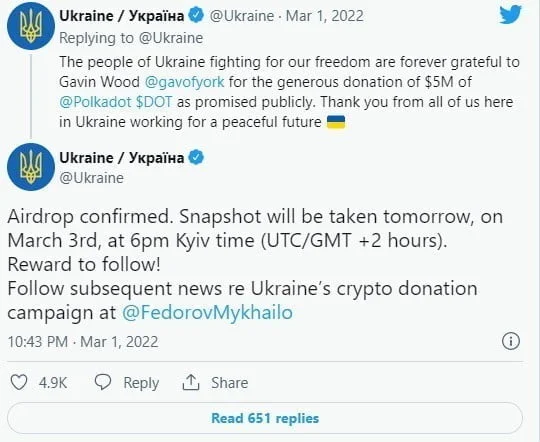The Ukrainian government said on Tuesday that gifts totaling more than $50 million would be airdropped to the country’s official checkbook. According to the country’s official Twitter account, an airdrop has been confirmed, and a photo will be taken on March 3 at 6 p.m. Kyiv time (4 pm GMT).
An airdrop is a promotional event in which a developing blockchain project distributes free tokens to members of its community. The move is intended to increase user engagement with the site.
Since last year, airdrops have acquired popularity in the NFT community. A free Ethereum-based coin called $SOS was recently distributed to members of the OpenSea NFT marketplace.
It was not immediately obvious what assets will be allocated, given that the Ukrainian government has been receiving bitcoin, ethereum, and tether donations since the beginning of the Russian invasion.
Ukraine has received more than $50 million in cryptocurrencies.
According to data aggregator Slowmist, the community has donated more than $50 million in digital assets to Ukraine within a few days after the government began seeking donations using cryptocurrency.
After electronic payments were suspended in the country following the Russian invasion, residents turned to Tether. A cash scarcity was also said to be driving Bitcoin transactions, according to reports.
Ukraine has also tried to use cryptocurrency to put more pressure on Russia to retreat. Several major exchanges have recently been asked by the government to completely ban Russians from their platforms.
Mykhailo Fedorov, Ukraine’s Vice Prime Minister, recently announced a reward for any information about Russian and Belarusian politicians’ crypto wallets.
The community was outraged by both actions. However, Ukraine has been a leading proponent of cryptocurrency adoption, with laws recognizing the technology even before the Russian invasion. Last year, the country came in fourth on Chainalysis’ Global Crypto Adoption Index. Recent sanctions against Russia, which are among the toughest in the world, have fueled speculation that the country could use cryptocurrency to get around the restrictions.

